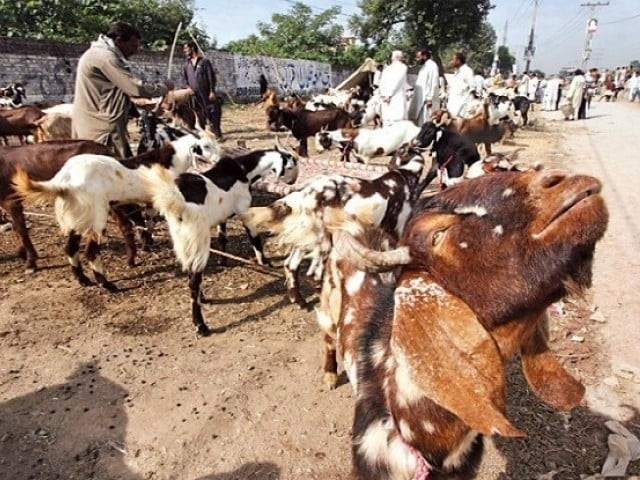Safety first: ‘Antiseptics, gloves necessary to ward off Congo virus’
Experts say people sacrificing animals must take strict protective measures

Cattle market for Eidul Azha 2015. PHOTO: ONLINE
They warned that since there were no apparent symptoms in infected animals, the risk of an outbreak was greater and this could lead to the loss of human life.
Hayatabad Medical Complex Deputy Medical Superintendent Dr Waliur Rehman said sacrificial animals must be sprayed. “Antiseptic spray is a must before the sacrifice otherwise it could spread Congo virus,” Rehman stated. He said wearing gloves is also a must to stay safe from cuts while slaughtering the animals.
“Sometimes infected blood can be transferred and that is the reason people should take good care. Just a small cut can cause death,” Rehman told The Express Tribune. He added parasites or ticks, which also transfer infected blood, can be spotted on the body but sometimes hide under the ears or hooves of animals.

University of Agriculture Animal Health department head Professor Dr Umar Siddiq Khattak said the virus could also be transferred to humans when a tick’s body splits open and the blood somehow mixes with that of a person.
“The most dangerous stage is if a person cuts themself while slaughtering a sacrificial animal and the tick’s body splits at the same time,” Khattak told The Express Tribune. He stated animals should be thoroughly checked for ticks.
Contradicting Dr Rehman’s view, Khattak said antiseptics were of little use as they do not kill ticks. However, he said gloves were absolutely necessary. The professor said ticks were found more in sheep than cattle because they have longer hair.
“Their favourite spots are the ears, front hooves and the abdominal area as these body parts are least exposed to sunlight,” Khattak said. He added Congo transfers from an animal to a human only through blood. However, it can be transferred from person to person just through breathing, he continued.
On August 2, the K-P health department directed the administration of three teaching hospitals in the provincial capital to immediately create space for Congo virus patients. At least 22 suspected cases were registered in the last seven months. Laboratory reports confirmed ten of them tested positive and seven of those lost their battle to the illness.
Published in The Express Tribune, September 23rd, 2015.













COMMENTS
Comments are moderated and generally will be posted if they are on-topic and not abusive.
For more information, please see our Comments FAQ